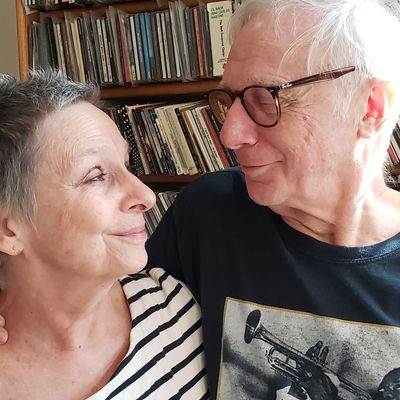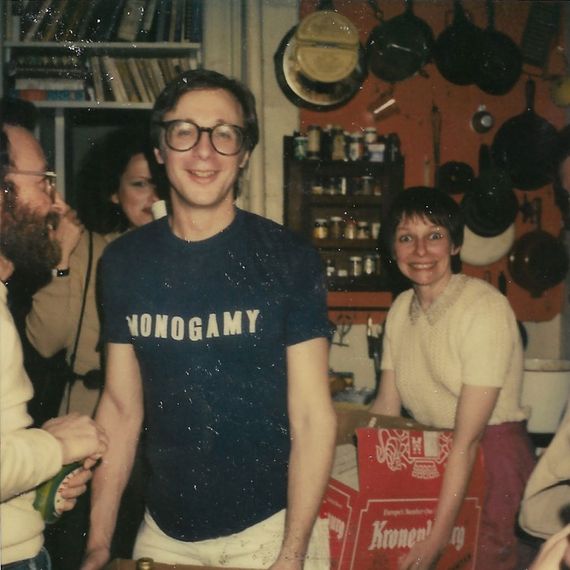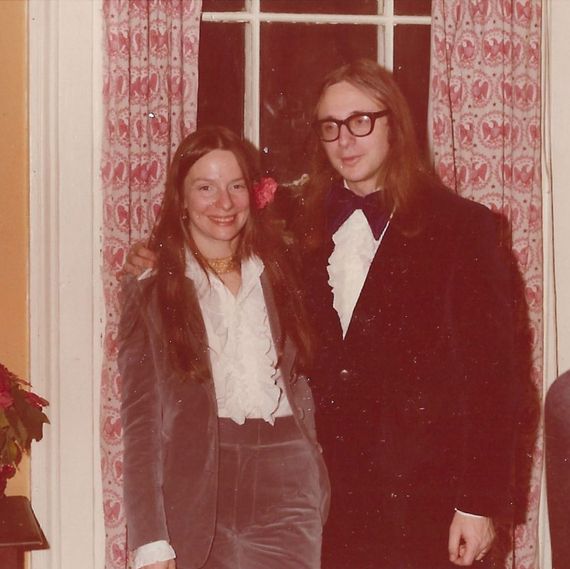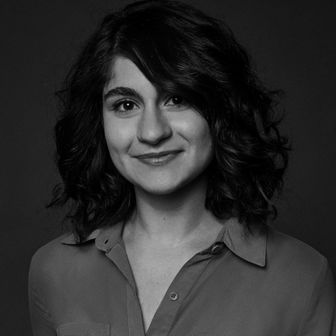
They say you can never understand someone else’s marriage. But this week, New York Magazine and the Cut decided to try. We interrogated dozens of couples (and a throuple) to see what makes their marriages work — or not.
Robert Christgau and Carola Dibbell, Married 46 Years
On Falling in Love
Robert: There was definitely an element of love at first sight for me.
Carola: I did not feel that way.
Robert: She didn’t even like me. It was two years before we got together. I ended up going out with her best friend, Dominique, on and off.
Carola: Dominique didn’t live in New York. So when she’d come to visit Bob, we’d often get together.
Robert: Sometime later, Carola had come over to my house with Dominique. We talked, got stoned, and listened to “Blanche.” Remember?
Carola: I certainly do.
Robert: By the Three Friends.
Carola: The worst song I ever liked.
Robert: By that time, she was teaching at a—
Carola: A liberated preschool.
Robert: In my heart was always the fact that I thought you were the hottest thing in the world. So then I see her with these kids, oh God. She was so wonderful with them. She was so funny and affectionate.
Carola: He knew that I had a crush on Quicksilver Messenger Service, which was a Bay Area hippie band. They had sent him a kite that said QUICKSILVER MESSENGER SERVICE. He sent it to me. I called Bob to thank him, and he asked me if I wanted to go to some shows with him. One was Bette Midler, whom I had never heard of.
Robert: My lesbian-only-we-didn’t-know-it girlfriend had already seen Bette Midler with me, and she was sort of into being independent and not doing everything with me. She wouldn’t hold hands in public because she thought it was sexist.
Carola: As we sat around getting stoned before the show, Bob said, “How are you? What’s been going on?” I, of course, told him every bad thing that had happened to me lately.
Robert: Can we say what the main one was, or you don’t want to talk about that?
Carola: Well, my brother was a person of interest in a murder. I was completely spaced out about that. It was like there was this empty place in me. Bob strode into that empty place with understanding of what I was going through. I don’t mean compassion. I mean intellectual understanding. It was really explosive. We had this amazing, wonderful time going to Bette Midler. It was clear that this was going to become romantic.
Robert: I took all your friends to a restaurant in Chinatown and we made out a little bit.
Carola: Right, but we didn’t sleep together. We slept together the next week, right before I was going off to the ashram. You know, Bob wasn’t the only man I was juggling.
Robert: If I’m not mistaken, you slept with somebody else between that date and when you slept with me.
Carola: I think I slept with three guys that week.
Robert: I thought one was before the Bette Midler.
Carola: I remember the exact order.
Robert: That was only three days later. Friday night we went to Midler. And Tuesday—
Carola: I think you were the last of—
Robert: Oh yeah. I was the last. Thank God. I thought it was the advertising guy, whatever he was. The slick … anyway …
On Deciding to Marry
Carola: So there I was at this ashram, and I can’t remember whether I wrote a letter to one of the others or not, but I know that Bob sent me a letter at the ashram. And then I had a blowout with the swami and left before the time was over to stay with some friends, and I just all of a sudden got this epiphany: “Oh my God, I’m going to spend the rest of my life with Bob Christgau.”
Robert: And she knew.
Carola: Well, I knew he would not say no. I called him up. In those days, he would go to a pay phone and there were these secret phone numbers that you would do so that some bad corporation would have to pay your phone bills instead of … I can’t remember, and I called Bob.
Robert: I don’t remember exactly what was said. We never talked about marriage.
Carola: One of the things that went through my mind was all those experiments that I had been doing for the preceding couple of years with relationships, that there would be a way to condense that and put it into one relationship. The ideas that Bob had were about working within the system, bringing the political ideas that were so important and exciting into, like, a job at Newsday.
Robert: Or rock criticism.
Carola: Very much, yeah. I briefly had a female lover, really briefly, and I would go visit her at her collective and they were all constantly making posters saying SMASH IMPERIALISM. And Maryanne was old gay, and she wanted to put an asterisk and write at the bottom, “Smash imperialism, just leave monogamy alone.” But the rest of the people in that collective were really opposed to monogamy. There were a lot of these ideas that seem reasonable and then you find out that most people really couldn’t stand it. They would be really hurt when their lover would sleep with somebody else. I think I’m less ideological about that than Bob. We had many arguments about this. I’ve always been, If you want it, if that’s what you want to do, do it. But it’s not what we want to do.
Robert: We’ve had many arguments?
Carola: We used to argue about that.
Robert: I don’t remember that.
Carola: So would you say that you’re still more ideological about it?
Robert: Absolutely. We don’t know anybody who actually does it successfully.
Carola: Or not at all. But most of our friends are now in their 70s, so it’s an experiment just having sex at all.
Robert: Every marriage is different, and it’s impossible to understand your own marriage, really, much less anybody else’s. Sex has a logic and a history of its own. It can be that the sex itself takes off in some way, then that feeds the emotion, rather than the other way around.
On Differences
Carola: Bob’s candor really interested me when we were first together and also shocked me. He would say to somebody who’s dating somebody, “Oh, so are you sleeping together?” They’d go, “Um, yeah.”
Robert: Why not ask whether you’re sleeping together?
Carola: It’s none of your fucking business. Bob would also say exactly what he thought about somebody’s politics or a piece of music or whatever.
Robert: I think it’s a little bit of a piece of myself. I don’t lie. I was also incredibly cheap, and Carola is only pretty cheap. Until we had that first big crisis in our marriage, when Carola had her affair in 1980, I’m not sure we even owned a fan.
Carola: That’s right.
Robert: One very peculiar aspect of our marriage is that we really spend an enormous amount of time in physical proximity to each other. Even when I was working at The Village Voice, I only put in about 20 hours at the office. For years and years, I would edit people, and they would come over, and Carola would bring us tea.
Carola: If I liked them.
Robert: My attitude toward Carola is, If there’s some asshole who doesn’t like her, fuck that person. I want nothing to do with them. It’s a gift that I’m letting you meet this person. I think she makes me much more lovable than I might otherwise be because people are so glad to see her.
Carola: The other thing: I earn almost nothing. Even when I was doing journalism, the Voice was paying like $75 for a review.
Robert: It was more like between $110 and $125.
Carola: There you go! It wasn’t that Bob wanted me to be the housewife; it’s that I wanted to be a novelist and I was ready to keep at it, even if I wasn’t earning money and Bob was ready to support me.
Robert: Every once in a while, we would have a fight about money, because Carola has trouble writing. She’s very slow. When it’s a six-month period, yeah … sometimes I would get pretty upset. Once … can I tell that story or no?
Carola: Is that the one fight?
Robert: When I decided that the reason you weren’t writing is that I loved you? And that, therefore, I had to stop loving you?
Carola: It was really fucked up.
Robert: It was fucked up.
Carola: You said, “Maybe if I withheld love from you, then you’d write faster!” I could not believe it.


On the Best Years
Carola: I really liked that hot year in ’92, ’93, you know, the early ’90s. They were very exciting years.
Robert: Yeah. That was the best sex year. But I would actually name a couple of others. One would be the first punk year, ’76.
Carola: Yeah, I was going to say ’77, but that’s—
Robert: Or maybe ’77. And the other would be the year your novel and my memoir came out, 2015.
Carola: Our books came out within a month of each other. I mean, the punk years, we were having some problems.
Robert: Fertility was already a big deal in 1977.
Carola: And yet we had so much fun. I was so excited to be sharing that with each other. That dominated how we felt about it.
Robert: We even did the England tour, right? And we saw the Clash at Leeds, right? But we couldn’t conceive a child, and that was a tragedy. It was just not the agenda we had written for ourselves, but what we got instead was ten years of musical ferment that we’d shared, and even though it was interrupted by the affair, we got something back from not being able to conceive a child.
We struggled with this for ten years. When we finally adopted Nina, I can’t even tell you how—all of the annoyance that’s involved in caring for an infant, it just felt like a fucking privilege to be able to do it. I would do the 4 a.m. wake-up feeding. I can still remember having her against my shoulder and rocking her to sleep. That physical dependency was just great.
On the Hardest Year
Carola: 1980. Absolutely the hardest year. It was a very touch-and-go time in our relationship.
Robert: Well, to me — and I could be fuzzing things over here — we were rebuilding. So you tell me about it on a Tuesday, I believe that you came over on a Saturday, and we ended up making love. And I would imagine the week after that I regarded the relationship as not all better but an ongoing thing—
Carola: I basically felt that way too, but there were always moments when it looked like we weren’t going to bring it off.
Robert: And there were certainly times when I got completely enraged and yelled at you. But given what was going on, given that from the beginning of May to the end of July, you were actually having the affair, there were a lot of disconnects between us.
Carola: Yeah, but it wasn’t the hardest. The hardest period was when I told you and when we briefly separated.
Robert: But, Carola, it wasn’t so great in June and July, when the relationship with him was no longer exciting; it was just more and more angst. Right?
Carola: I mean, whatever you say is true for yourself …
Robert: No, no.
Carola: The hardest time in our relationship was when we were dealing with the consequences of that and we were fighting all the time.
Robert: I’m not going to haggle over details.
On Getting Cancer
Carola: I started to have rib pain. Nobody could diagnose it. A lesion showed up and then he got me to Sloan Kettering.
Robert: They got the bad part of the rib.
Carola: Until the actual diagnosis came in, everybody was saying it didn’t look like cancer. The diagnosis came in January. I understood that this is not like pancreatic cancer, it’s not like ovarian or lung cancer. It has its ways of being treated.
Robert: It can be more like a chronic illness than a terminal illness. Usually people die of something else.
Carola: I always assumed that I would be caring for him … that he would get sick. I never thought that I would be sick and Bob would be caring for me, and he has shown new sides. When we were first together, Bob was this emotional guy who would get incredibly upset when things didn’t work out and get angry at the car or whatever, and I would be very patient and just wait a man out. I think Bob has gradually become more patient and more tolerant in the interpersonal. I’ve become, in some ways, less patient.
Robert: We wrote the traditional marriage vows: in sickness and in health. As soon as this happened, I remembered that part of the vow and I said, Okay, this is what you’re in it for. And now you’ve got to prove you can do it. It was a privilege.
Carola: I hate to be so dependent.
Robert: When it first came up, I thought she was going to die and I had all kinds of fantasies. I would sometimes think, Who am I gonna be with after she dies?
Carola: I did too.
Robert: About a week in, neither of us had mentioned to the other that Carola might have a fatal illness. Then Carola basically told me that she’d been thinking about the same things. Once it was on the table, it became the most important thing in our lives. When we were doing infertility treatments, she had this really bad thing that had to happen to her every month. I only went to two or three of them, and it was one of the reasons I think she had the affair in the end. I neglected her, and believe me, I’ve felt stupid about it ever since. So in this case, there was never any question. I was going to every medical appointment with her. In fact, in the end, every once in a while she would tell me that I shouldn’t come.
Carola: I really wanted to be as independent as I could. I feel my values would require me to be unembarrassed about my aging body, and yet I’m not really.
Robert: I think about it in terms of sex, I’m sure, because sex remains very important to us, thanks to GlaxoSmithKline, you know? I mean, we were prepared for the long haul.
Carola: When you’re in a long marriage, these things are so bound up with each other, so my relationship to you, the you at 76, I experience the whole last 40 years as part of what I see in you. It’s like the person that you’ve grown old with carries some of your past with them. Does that make any sense to you?
Robert: Not exactly. There’s something about the phrasing that I’m not connecting to.
Carola: I’m not as old in our relationship as I am in the world. Because it contains our past.
Robert: Yes, I think that, yes. I think about our beginnings all the time. I’ve said to her many times, “What were those other guys thinking? What the fuck is wrong with them? They could have had you.”
Carola: And I keep saying to him, “They didn’t drop me. I dropped them.”
Robert: But not the guy from Texas.
Carola: All right, yeah, true.
Robert: You know? Fuck, and Gardner, too. Those are the two I think about. You jerks. What schmucks you were.
Plus: We Asked Couples Outside the City Clerk’s Office About Getting Married
“It’s just a manifestation of our love; it is very strong.”
“We decided about three days ago. We’ve got our son, a dog. I thought, ‘Let’s just do it.’ ”
“I hope we avoid money fights. But everything else I think we can handle.”
“I think we’ll have a lot of great times together, but we’ll also have some hard times. As long as we’re taking care of each other, we’re gonna be okay.”
“I guess it’s important mostly because it’s important to our families. It’s important to us, I guess. I don’t know if there are tax breaks involved. [Laughs.] No, no, it’s a nice symbol.”
“Noah quit his job and needs insurance. And I have terrific union insurance.”
And We Tried to Ask Couples Outside Kings County Supreme Court About Getting Divorced
“I’m not interested.”
“I’m not in a place to talk about it yet, but you can try my husband down the hall.”
“No.”
“I don’t have anything good to say about marriage.
*This article appears in the April 1, 2019, issue of New York Magazine. Subscribe Now!







